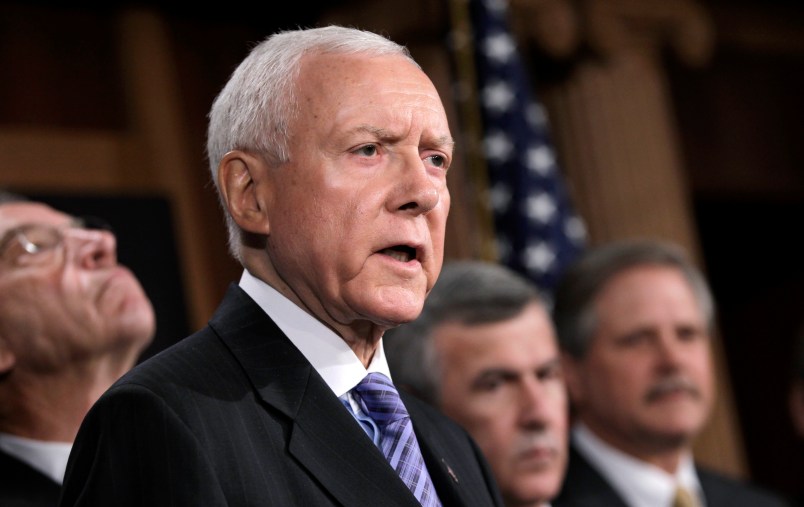WASHINGTON — The Republican chairman of the powerful Senate Finance Committee gave a speech Monday in which he tried to explain apparent discrepancies in his position about the validity of Obamacare tax subsidies on the federal exchange.
The Supreme Court is scheduled to hear oral arguments next week in King v. Burwell, a challenge to the validity of Obamacare’s federal tax subsidies. At issue is what the statute says about the subsidies, and what Congress intended when it passed the signature legislation of President Barack Obama’s first term. If the Supreme Court were to invalidate the subsidies, it would undermine a key element of the financing for Obamacare’s coverage expansion.
“Lacking any credible textual basis for their position,” Sen. Orrin Hatch (UT) said at the conservative Heritage Foundation, “the president and his supporters have taken instead to twisting my words and the words of other Obamacare opponents to claim that we used to agree with the president’s argument” on the subsidies now at stake in a Supreme Court case. “There is no excuse for twisting my words and imputing to me positions I have never held. Not then, not now.”
In 2010, Hatch co-wrote an op-ed in the Wall Street Journal which suggested that setting up a state exchange was not a condition for residents to receive Obamacare premium tax credits. He wrote (emphasis added):
A third constitutional defect in this ObamaCare legislation is its command that states establish such things as benefit exchanges, which will require state legislation and regulations. This is not a condition for receiving federal funds, which would still leave some kind of choice to the states. No, this legislation requires states to establish these exchanges or says that the Secretary of Health and Human Services will step in and do it for them. It renders states little more than subdivisions of the federal government.
Now, as the Supreme Court prepares to hear King v. Burwell, Hatch has fully embraced the challengers’ argument that the law prohibits the subsidies, and has asked the justices to overturn them. He accused Obama on Monday of exhibiting “open defiance of clear statutory text” and an “utter disregard” for Congress in allowing the federal tax credits.
“The text of this provision could not be more clear,” the senator said. “The incentive for states to act could not be more clear. … If a state fails to establish an exchange it loses out on millions, quite possibly billions, in subsidies.”
The Obama administration invokes Hatch’s 2010 op-ed in its brief with the Supreme Court, writing that he “expressed a similar view [as the government is now taking] while the Act was under consideration.” The purpose is to rebut a narrative advanced by the law’s challengers that Congress clearly intended to confine the subsidies to state-run exchanges and not the federal exchange.
Hatch devoted a significant portion of his speech Monday to countering the suggestions that he — like other top congressional Republicans and state officials — interpreted the law to provide subsidies to Americans regardless of where they lived. But his argument was less than compelling: He said his op-ed wasn’t about the King lawsuit (which didn’t exist at the time) and that his argument was about states, rather than the eligibility of individuals for tax credits.
“The op-ed has nothing to do with King. The op-ed is about the constitutionality, or rather the unconstitutionality, of Obamacare, whereas King is about the meaning of a specific provision of Obamacare,” Hatch said. “Different issues, different questions, different analysis.”
Oral arguments in King are scheduled for March 4, and a ruling is expected by the end of June.







“As I said before, clearly…”
Hatch is the one twisting words and accusing others of doing the same with his own statements. Go figure!!
Hatch has been a lying hypocritical partisan hack for as long as I can remember. And just for the record, lest anyone not know exactly what a crock this case is, here’s the definitive demolition of King using just the text of the law itself (nicely supplemented with a few choice quotes from Scalia):
Holding my breath that Roberts ultimately won’t want to be responsible for the tanking of the insurance industry, or to see his name go down in history as the hack Chief Justice who signed off on such a transparently bogus argument. (He certainly won’t consider the human suffering he’d be responsible for – that consideration doesn’t enter into the right’s oh-so-scrupulously strict judicial umpiring – but corporate suffering is another story.)
One would think that this old racist would finally be struck,mid sentence, with the realization that he is fighting the old fight but it’s against a guy who gained, through no chicanery or favoritism, the editorship of the Harvard Law Review and is now the President of the United States and think, " Oh shit…I guess it’s too late for this crap anymore."
This ain’t 'bout no ACA, this is about Orin Hatch living in grandpa’s time.
How will McConell explain it to Kentucky if their now,much loved health care is repealed by his party?
He’s pulling a Newt Gingrich – as in “Any ad that quotes what I said on Sunday is a falsehood.” But hey, Orrin Hatch was the king of the flip-flop long before Gingrich or Romney.